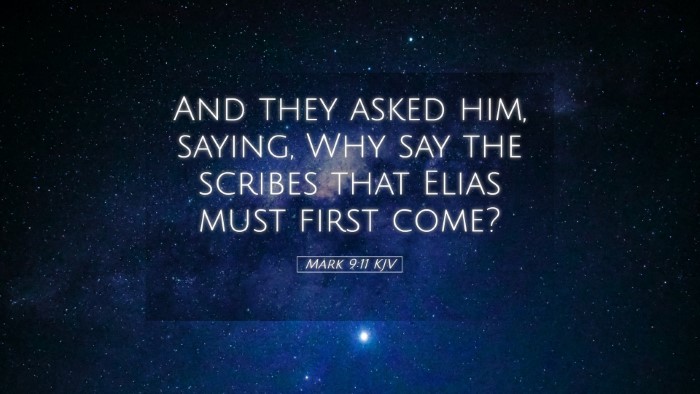Commentary on Mark 9:11
Verse Text: "And they asked him, saying, Why say the scribes that Elias must come first?" (Mark 9:11, KJV)
Introduction
This verse appears in a narrative following the Transfiguration of Jesus, where He is transfigured before His closest disciples. It reveals the confusion of the disciples regarding the prophetic teaching of the coming of Elijah as a precursor to the Day of the Lord. In order to ascertain deeper theological insights, we shall draw from various public domain commentaries.
Context and Background
The questioning of Jesus by His disciples regarding the necessity of Elijah's coming reflects a common Jewish belief based on the prophetic traditions found in the Old Testament, particularly in Malachi 4:5. The disciples' inquiry highlights the interplay between expectation and fulfillment within the ministry of Jesus. They are grappling with the implications of Jesus' identity and the events they have witnessed.
Insights from Matthew Henry
Matthew Henry notes that this question points to the prevalent Jewish understanding that Elijah must come before the Messiah. He emphasizes that the expectation of Elijah's return was rooted in the prophecy but misunderstood. Henry further remarks on the disciples' earnestness in seeking clarity, demonstrating their desire for understanding amidst the miraculous revelation of Christ's glory during the Transfiguration.
Insights from Albert Barnes
Albert Barnes expands on this by discussing the scriptural basis for the expected ministry of Elijah. He cites that the prophecies were often understood literally by the Jewish people. Barnes explains that the coming of Elijah is a symbol of restoration and that through this questioning, the disciples reveal their misunderstanding of Jesus’ role and the nature of the kingdom He is establishing. He elaborates on how this inquiry connects to the broader theme of revelation and divine timing in God's salvific plan.
Insights from Adam Clarke
Adam Clarke emphasizes the theological implications of this question. He points out that the appearance of Elijah serves as a harbinger of divine intervention and renewal. Clarke further explains that the disciples, having witnessed the Transfiguration, are beginning to see Jesus in the light of fulfilling these prophecies, yet they struggle to reconcile their eschatological hopes with the reality of Jesus' ministry. Clarke’s analysis offers a transition from prophecy to Christ's present mission.
Theological Themes
- Prophetic Fulfillment: The inquiry into Elijah’s return denotes a rich tradition within Judaism concerning prophetic fulfillment. The verse engages the reader in considering how Jesus is the fulfillment of both the law and the prophets.
- Expectation vs. Reality: The disciples' expectations reflect a common human phenomenon where preconceived notions clash with divine realities. This theme invites reflection among leaders and scholars on the ways in which modern expectations may need to be realigned with biblical truth.
- Understanding the Kingdom: As the disciples ask about Elijah, they are grappling with the nature of Jesus' kingdom. This theme invites deeper exploration of the nature of Christ’s ministry and the implications for kingdom living today.
Significance for Pastors and Theologians
This verse serves as a rich case study for pastors and theologians in understanding the dynamics of expectation, revelation, and the nature of Christ’s ministry. It prompts important pastoral questions about how contemporary believers understand and interpret prophetic expectations in light of New Testament revelation.
Application and Reflection
The inquiry posed by the disciples provides a framework for self-examination within church communities. It challenges leaders to engage their congregations in discussions around biblical prophecy and its implications for their faith journeys. Reflection on the misunderstanding of expectations can lead to deeper faith and greater openness to God’s revelations through scripture.
Conclusion
Mark 9:11, through the lens of various commentaries, underscores the importance of understanding the interplay between prophecy and the sovereign work of God through Christ. It calls upon us to pursue deeper revelations of truth, aligning our understandings with the full counsel of God as revealed in Jesus Christ. As we navigate the scriptures, we are reminded to seek clarity amidst confusion and to recognize the profound depth of the divine narrative unfolding throughout biblical history.


